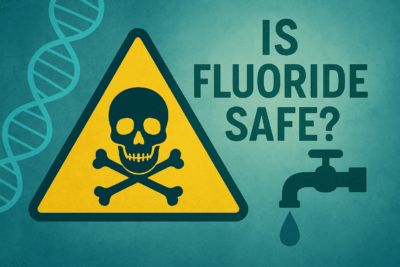
In a landmark 2024 decision, U.S. District Court Judge Edward Chen ruled that fluoride in drinking water may pose an “unreasonable risk” to children’s brain development — a move that has reignited public debate over the long-standing practice of water fluoridation.
The lawsuit, filed by several environmental and health advocacy groups, challenged the Environmental Protection Agency (EPA) under the Toxic Substances Control Act (TSCA). At the heart of the case was growing evidence that fluoride, while intended to prevent tooth decay, may have unintended effects on cognitive health. Judge Chen cited a 2024 report from the National Toxicology Program, which found “moderate confidence” that higher fluoride exposure is associated with reduced IQ in children1.
The court ordered the EPA to re-evaluate its fluoride safety standards, which currently allow up to 4.0 mg/L in public water systems, although the agency recommends 0.7 mg/L for cavity prevention2. While this ruling doesn’t ban fluoride, it does require the EPA to reconsider whether the practice is truly safe — particularly in light of new research and shifting public opinion.
Allergic Reactions to Fluoride: A Lesser-Known Concern
Although much of the fluoride conversation centers on neurotoxicity and long-term exposure, there’s another issue that deserves attention: hypersensitivity reactions. Yes, some individuals can have allergic-like responses to fluoride compounds — and the medical literature supports this.
A 2024 case study published in Contact Dermatitis documented a patient in Italy who developed allergic cheilitis (inflammation of the lips) after using a toothpaste containing stannous fluoride. Once the product was discontinued, the symptoms resolved3. Another study published in 2018 described similar reactions to fluoride in oral care products, confirming that these sensitivities, while uncommon, are real4.
These findings raise important questions about the ethics of adding any potentially reactive or allergenic substance to the public water supply — especially one that’s meant to be used as a preventive medical treatment.
When Medicine Enters the Tap
Fluoridation is one of the only instances where a substance — intended to treat or prevent a health condition — is delivered through a public utility rather than individual choice. That means everyone, regardless of age, medical history, or preference, consumes it by default.
This mass-medication approach runs contrary to the principle of informed consent, a cornerstone of ethical medicine. People who are sensitive to fluoride, or who may already have neurological or immunological concerns, cannot easily opt out. The water that runs from their tap — and into their coffee, soup, and food — comes with an additive they didn’t request and can’t avoid.
Time for a Rethink?
While fluoride has historically been viewed as a public health success, changing research and growing awareness about ingredient safety suggest it’s time to reconsider how — and if — it should be delivered. Targeted, topical use in toothpaste or dental treatments could provide the same benefits, while allowing individuals to control their exposure based on personal needs.
Whether you’re concerned about neurodevelopment, allergic reactions, or simply the right to make informed decisions about your health, one thing is clear: the conversation about fluoride is far from over.
🧪 References
- Newsweek. “EPA Ordered to Address Risks of Fluoride in Water Linked to Children’s IQ.” Sept. 25, 2024.
https://www.newsweek.com/… - CBS News. “Federal court rules against EPA in lawsuit over fluoride in water.” Sept. 25, 2024.
https://www.cbsnews.com/… - Saracco, E., et al. (2024). Allergic cheilitis due to stannous fluoride-containing toothpaste: First case from Italy. Contact Dermatitis, 91(4), 371–373.
https://pubmed.ncbi.nlm.nih.gov/38946175/ - Toma, N., et al. (2018). Contact allergy caused by stannous fluoride in toothpaste. Contact Dermatitis, 78(4), 304–306.
https://pubmed.ncbi.nlm.nih.gov/29527723/
Nature's Complement is a participant in the Amazon Services LLC Associates Program, an affiliate advertising program. If you purchase products on Amazon through any of our affiliate links, we get a small percentage of the transaction, at no extra cost to you. We spend a lot of time writing the articles on this site, and all this information is provided free of charge. When you use our affiliate links, you support the writing you enjoy without necessarily buying our products. (However we would appreciate if you would do that too!) Thank you for helping to support our work, however you choose to do so.
These statements have not been evaluated by the Food and Drug Administration. This information and/or products are not intended to diagnose, treat, cure or prevent any disease.


